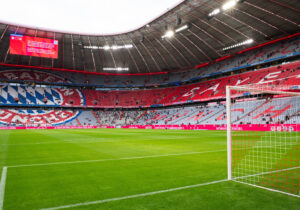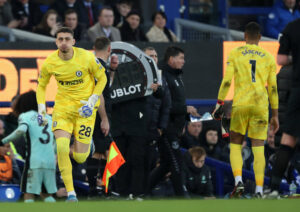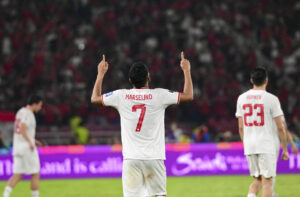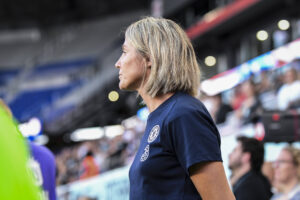There are many global traditions in football. Few are more commonplace than that of fans becoming far too attached to their teams’ promising young players. The idea of unearthing a hidden gem who goes on to represent one’s club for years to come, or at least gets sold for a tidy profit, is an enticing one. But in reality, only a tiny percentage of young footballers ‘make it’ at the highest level. Arsenal fans’ anger at the William Saliba situation could prove to be futile in the long-term, but this does not change the fact that he deserves more of a chance in the first-team.
In his spells at both Saint-Etienne and Nice, Saliba showed signs of genuine maturity and intelligence, as well as some very promising physical attributes and plenty of confidence on the ball. He is still very young, and has a long way to go in his development, but all the evidence suggests that Mikel Arteta’s refusal to play him in the first-team at Arsenal is at the very least harsh, and the club’s decision to loan him out to Marseille next season, possibly with an option to buy included in the deal, is outright baffling.
Arsenal’s William Saliba Situation is High-Risk, Low-Reward
Saliba is a 6’4”, 20-year-old defender whose youth belies his experience at the top level. He has already made 51 appearances in Ligue 1. Whilst he is not yet the finished article, and was caught out of position on a handful of occasions at Nice last year, he showed plenty of promise.
At Arsenal, things have not worked out so far. Arteta left him out of the first-team squad entirely last season, preferring even Shkodran Mustafi in the starting line-up. Saliba’s performances at Nice, which included a couple of Man of the Match awards, further proved the obvious: he deserved to be given some playing time last year, at least in some Europa League fixtures, and it was not productive to play defenders like Mustafi, who left the club in January (and isn’t very good at ‘any aspect of defending’) ahead of him.
Defensive Options
For the first time in several years, the glaring weaknesses in Arsenal’s squad are not at centre-back. This may be because the weaknesses in almost every other area are so glaring as to make the centre-backs look decidedly un-glaring by comparison, but it is still a welcome change. Gabriel had a promising first season at the club, despite making a handful of errors, and benefitted from regular playing time. Pablo Marí, another left-footer, has had injury worries and is clearly not quick, but at 6’4” and with some level of positional sense, he is not a bad back-up.
The main issue lies among the right-sided centre-backs. At the moment, Saliba, Rob Holding, and Calum Chambers, more of a utility player, are the sole options following David Luiz’s departure. Holding, though he is popular among some fans, is not going to be a quality option as he reaches his prime years. He is slow, does not have the positional awareness to make up for his lack of pace, and can be bullied by stronger and faster strikers. His lack of confidence on the ball is another issue, especially when he plays on the right side of a back three (which has been evident since the 2017/18 Europa League group stage).
There is a chance that Saliba could help the lack of quality on the right-hand side of the defence. Bedding him in alongside Gabriel, as first-choice with only Holding behind him, would be a gamble, however. Arsenal should be aiming to finish much higher up the table this season, and therefore it makes sense that they should be in the market for another defender. But is Ben White, for whom the club have already bid, really the answer?
Comparing Ben White to William Saliba
Twenty-three-year-old White impressed for Brighton & Hove Albion last season. Before that, he had a very promising season on loan at Leeds United. The fact that he has already garnered so much experience in England will excite fans, but replacing Saliba with someone who is also not the finished article, still leaving Holding as a key back-up, would be a risk in itself.
White has proven to be a reliable defender. He is consistent and not too error-prone, but there are worrying weaknesses in his game. Last season, despite attempting fewer passes than most centre-backs in Europe’s top five leagues (49.81 per 90 minutes), his pass completion (83.2%) was only in the 35th percentile of defenders. This does not definitively prove that he is ‘weak’ on the ball, but he has still given the ball away, either through misplaced passes or being dispossessed, too often. Compare this to Saliba, who ranks among the top percentile of defenders in Europe’s top five leagues in nearly all passing metrics. Further, White was dribbled past 1.13 times per 90 last season (more than 93% of defenders), only winning 37.5% of tackles vs dribblers. The fact that he was so easy to get past is not a good sign.
Of course, even advanced statistics like these are not decisive. When looking at centre-backs, one has to look at the whole ‘package’, as they play alongside a partner, who can negate weaknesses. The overall point is this: why should Arsenal risk giving up a future talent, possibly for not much money, if the risk-reward ratio is not greatly improved by his replacement? It would surely make sense either to sign an experienced centre-back as a foil for Gabriel and Saliba, or to sign White alongside those two, and accept any pitfalls of having three young defenders.
The Future
It would be very interesting to see how Saliba would do in the Premier League. Newcastle United have already been touted as a suitor, but a team like newly-promoted Brentford would also be a great fit. Pontus Jansson, Ethan Pinnock, and Mads Bech Sørensen are three very good defensive options, but Saliba’s pace and confidence on the ball could add something extra. Brentford’s attitude towards young players has always been much more patient than many other clubs, and perhaps they would be able to give a young centre-back the support he needs.
Discussions about Saliba’s future may already be obsolete. Plenty of reports suggest that he will be joining fellow youth exile Matteo Guendouzi at Marseille. It may turn out that Arsenal were right to get rid of both. It is hardly uncommon for fans who were angry at a club for not playing, and eventually letting go of, a young player to be wrong (“Get out while you can, Joel” springs to mind), but this does not change the fact that the club have managed this situation very poorly.
Arsenal have a rare amount of young talent available. To flourish, these players have to be given a chance. Mikel Arteta has a responsibility to get the most out of the assets he has at his disposal, and casting players like Saliba aside without truly seeing what he can do is a risky game to play. If a team choose to reduce the opportunities of their young players, it is usually in place of a ‘win-first’ mentality, where short-termism is understandable. At the moment, it looks like Arsenal have found a way to stunt a precocious talent’s development without doing much winning at all.
Main Photo






